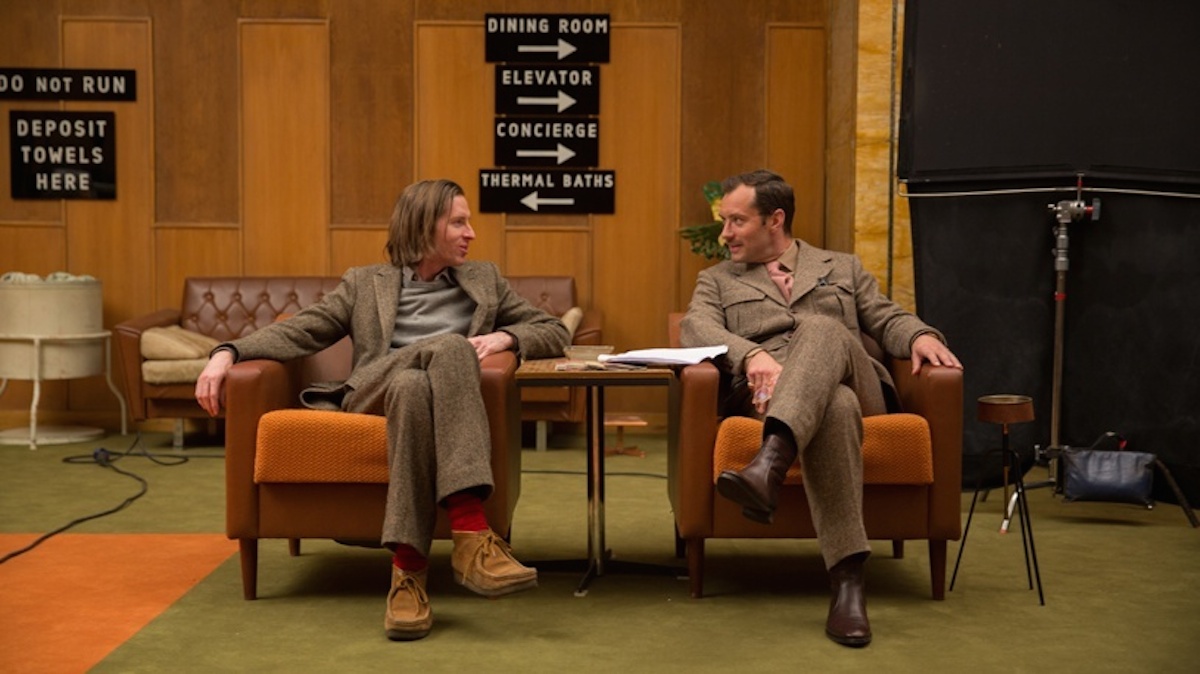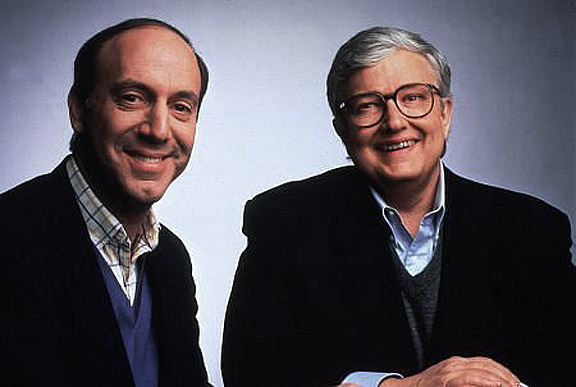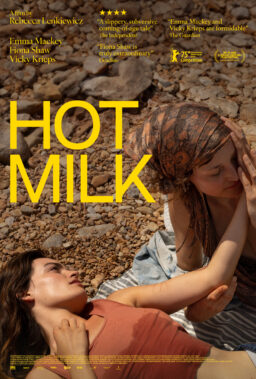Wes Anderson’s newest film, “The Grand Budapest Hotel“, is a charming confection, equal parts broad physical comedy and wistful nostalgia, all held together with his trademark stylization. On March 1st, he came to Chicago by train for a quick overnight stop to introduce a screening of the film at Chicago’s Music Box Theatre. Literally straight from the train and not even settled into his hotel room long enough to have gotten a shower, Anderson was nonetheless gracious enough to sit down and talk about the movie before getting ready to introduce the film. He’s charming and just a bit awkward, catching himself in long but fascinating digressions and apologizing for it. No apology is necessary, of course; he’s a great conversationalist.
One of the things about the movie that I love is the nested framing stories—the girl reads the book in the cemetery, which leads to a scene of the author of that book speaking a sort of introduction to the book, and then in the book he tells a story about an earlier time when someone sat down with him and told a story about an even earlier time. Could you talk about that?
The way the whole movie started was that many years ago, my friend Hugo and I—I want to say like six years ago or so—started making up this story based on a mutual friend of ours. The character Ralph plays is sort of based on that. And we wrote some scenes and things, but it was not set in the past and he was not a hotel concierge, but it was the character and it was some of the events of the plot. I’m reluctant to use the word plot in relation to any film that I’ve made, but I think that this one actually has one, so we can call it that. But anyway, we only got so far and we couldn’t make it work. We only would have had a fifteen minute movie or something. But we had a character. So I sort of set it aside and did a couple of other movies. And then while I was finishing the editing of the last movie I did, “Moonrise Kingdom“, I had this idea. I had been thinking that I would like to do a movie inspired by Stefan Zweig’s work. He’s a writer I hadn’t known but had just discovered in the past few years.
Yes, he’d been very famous in the 1920s and ’30s, but sort of disappeared, at least to Americans.
Exactly. I had this thought of taking what we had and doing it in a Stefan Zweig-esque setting and making it like a Zweig novel and at the same time putting it in a hotel and making it about a hotel concierge. I had both those ideas at once, and then Hugo and I wrote the whole script. Well, one of the big things from Zweig…one of the first books by Zweig I read was “Beware of Pity”, and it begins with a sort of message from the author, really not Zweig but an author character, and what Tom Wilkinson says is just a very close adaptation of that. It’s a shorter slightly revised version of that. And then, in “Beware of Pity”, it goes back twenty years or so and it describes an encounter between the author and this man he meets. It’s a sequence of scenes. And the man the author meets says, “I can tell you my story, but it’s going to take some time so we should go someplace.” So, they go somewhere and he tells this tale further in the past. And we’ve seen this device in lots of different ways over the years, but he does it especially effectively, and I later saw that he does it over and over again in his short fiction. Practically every story has that form. And it’s a form we’re more used to in a Conrad or a Kipling kind of context, a big tale. And Zweig does it with these very psychological, more intimate stories. So…that’s a very long explanation for why we did this. It comes from Zweig.

But I think it works especially well for your film, because the further back we go, the more it opens up to your kind of fantasy world of the hotel. And that works because we’re put at two removes: the author, who hears a story 20 years earlier from a man about an era another 20 years earlier.
Yes, we’re at two removes from today. We take our first step and then another. We go back more into this belle époque winter wonderland
You’ve also mentioned in interviews that another big influence is films of the 1930s. I’ve seen “Love Me Tonight” mentioned, but I imagine you’re also thinking of “The Love Parade”.
“The Love Parade”…Is that the Lubitsch musical?
Yes, set in a mythical country called Sylvania…
With Maurice Chevalier and Jeanette MacDonald one. Yes, that’s maybe 1930?
1929. With creaky sound from the transitional phase of sound recording.
Is that the one where he is a captain and the woman is the princess. Yes, I know it.
But you’re taking Zweig, who is serious literature, and crossing it with Lubitsch and film comedies…
Yes, much lighter. Well, I had envisioned as we started writing that we were writing something more Zweig paced with a Zweig rhythm. And I was thinking that our inspiration would be more like Ophuls and it would be more European feeling. And we sort of started there. The Jude Law– F. Murray Abraham part [with the younger version of the author meeting the man who tells him the tale] is slower, and they talk like a book. It’s a heightened literary kind of thing. He says things like “Forgive me for saying but I must admit I did indeed do the thing of which…” [Both laugh]
I’m sure Jude Law and F. Murray Abraham thanked you for that.
By the way, Jude and Murray are both so comfortable with words and text that they immediately took to it. F. Murray Abraham—I’ve never seen anyone with such an acute sense of a line reading. He’s very natural and such a great actor, but you can also see his decision about how to read a line. On the set he’ll say “I was thinking about going this way or this way or this way.” I think his ear is a big part of how he works. I don’t know if he’d say that himself, but that was something I felt.
A big surprise for me in the film is that Ralph Fiennes is so funny and so good at physical comedy. He is great at the poetry, of course, but did you know he’d be so good at the physical part, the comedy part?
Yes. Right. Well, I had seen him in “In Bruges“, and in “In Bruges” he’s very funny. I mean, he’s scary but he’s also very funny. And I had also seen him in a play in London, “God of Carnage”. This London production was different than the American one. It’s a French play and when they did it in America they translated it but they also set it in Brooklyn. But in England, in this production, they kept it in Paris. I live part of the time in Paris, and so when I went I saw certain kinds of behavior that were recognizably French. He was in it and he was very funny. He played the part Christoph Waltz plays in the movie. He was great and funny. And I’d also gotten to know him over the years and wanted to work with him, but I had also gotten a sense of his very gentle side of his personality and that he’s almost…I don’t want to say courtly, but his manner is that he is extremely polite. And, not a comic timing thing, but I’d seen this movie “Bernard and Doris,” directed by Bob Balaban, and in that he has some aspects of the character. But I have to say I’d never seen him do this much with the punctuation of things.

The physical work is just so fun to watch.
Oh, good, good, good. I had so much fun with Ralph. He was so great to work with, such a collaborator.
His ability to sell sophistication even in the prison is great.
The funny thing is to see him be exactly the same no matter what the circumstance and not be intimidated even by the terrifying people he is now with.
I know you were in the habit of showing movies to the cast, and that you all ate dinner together every night. It sounds like a sort of European salon. Can you talk about that working method.
Well, Owen Wilson was saying to me that with each movie I seemed less relaxed. He said you’re getting tenser and tenser with every movie. I feel that and I kind of want that. This is not our time to be relaxed. We can have fun, but we need to stay fast and focused. We work very fast, and I like that. But as soon as the whistle blows and the day is done, we all go back to the same hotel together. It was a very small hotel in this case, a place called the Hotel Börse and we occupied the whole place. The ground floor had a kitchen and a breakfast room and a couple of other spaces. There was a space by the front desk and that was where we did the makeup. People would come back from the set and get out of their costumes, because they’d put on their costumes in the hotel, and take a shower. After a break people would come down to the lobby and have a drink and relax. And as soon as dinner was said to be close to ready we’d move into the next room and sit down for dinner. We had a friend of mine who had come to Germany to cook for us. He’s Italian, but his wife is German, and it was a very god set-up for them. But anyway, then we had two or three tables in this room. If it was a salon, it was a salon where there wasn’t anybody that was presiding over it and holding court, it was just everybody very relaxed. A lot of people who are friends with each other, an lot of people who have worked with me, and a lot who have worked with each other in other places. Ralph had worked with [Dafoe] and Harvey Keitel and Fisher Stevens in all these different configurations. The main thing was that it was totally relaxing and fun, and we still talked a ton about we’d just done and were going to do the next day.
So you’re still talking shop.
Yes, still talking shop, but it was fun and relaxed and there were visitors who’d come for a meal. I think somehow that everybody unwinds, but people aren’t going off to different hotels and seeing their own friends and doing their own things. They’re still in it until they’re finished, and then they can go back to their own lives.
There must be real advantages for you to keep them all in one place that way.
I think so, and they seem to like it. They’re all people who are committed to the work, and I think they feel good about it.
You may have heard Jeff Goldblum was singing your praises the other night on “The Colbert Report”.
I hadn’t heard that; I’ll have to see that.

He was saying “I couldn’t believe it, I didn’t want it to end.”
I’ll have to see that. You know, I’ve worked with Jeff before, and in this he has these long, long speeches. There are few actors who you can say “Here are your 42 paragraphs…” and he takes them and he shapes them.
You’ve got a showcase for a lot of people in this.
Yes, we’ve got Harvey Keitel, whom I love and Willem [Dafoe] and Adrien [Brody] and Edward Norton. And Tilda Swinton.

Who everyone loves.
Yes, everyone loves her. And she’s not just an actor, she’s this sort of performance artist avant garde something or other and she’s very very bright and very very funny and has a humility for someone who has such an aura.
Well, I know you have to get ready to go present the movie at a screening.
Do you have what you need? Was this okay?
If I say no, do I get to stay? [Both laugh]











